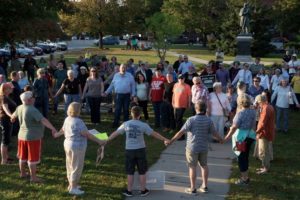I’ve Had It With Rev. Wright
The media tour he's conducting is doing a disservice that goes beyond any impact it might have on Obama's presidential campaign.Note: This column has been updated since its original posting in light of Barack Obama’s Tuesday speech.
WASHINGTON — We all have our crosses to bear. The Rev. Jeremiah Wright has become Barack Obama’s.
I’m sorry, but I’ve had it with Wright. I would never try to diminish the service he performed as pastor of his Chicago megachurch, and it’s obvious that he’s a man of great charisma and great faith. But this media tour he’s conducting is doing a disservice that goes beyond any impact it might have on Obama’s presidential campaign.
The problem is that Wright insists on being seen as something he’s not: an archetypal representative of the African-American church. In fact, he represents one twig of one branch of a very large tree.
It’s understandable, given how Wright has been treated, that he would want to attempt to set the record straight. No one would enjoy seeing his 36-year career reduced to a couple of radioactive sound bites. No preacher would want his entire philosophy to be assessed based on a few rhetorical excesses committed in the heat of a passionate sermon. No former Marine would stomach having his love of country questioned by armchair patriots who have done far less to protect the United States from its enemies.
Given Wright’s long silence, I thought he had taken to heart Jesus’ admonition to turn the other cheek. Obviously, I was wrong.
I’m through with Wright not because he responded — in similar circumstances, I certainly couldn’t have kept silent — but because his response was so egocentric. We get it, Rev. Wright: You’re ready for your close-up.
He made some good points Monday when he entered the lion’s den of the National Press Club. I especially liked this one: “My goddaughter’s unit just arrived in Iraq this week while those who call me unpatriotic have used their positions of privilege to avoid military service while sending over 4,000 American boys and girls of every race to die over a lie.”
But his basic point — that any attack on him is an attack on the African-American church and its traditions — is just wrong. In making that argument, he buys into the fraudulent idea of a monolithic, monocultural black America — one with his philosophy and theology at its center.
In his speech Sunday at the NAACP dinner in Detroit, Wright spoke at length about how “different” does not mean “deficient.” He talked of how European and African musical and rhetorical traditions are different, and how that doesn’t mean that one is better than the other. The point was that there is no one way to preach the Gospel. In this, Wright is right.
Where he overreaches is in claiming, as he did at the Press Club, that the criticism he has suffered “is not an attack on Jeremiah Wright; it is an attack on the black church” — and in claiming that this episode “just might mean that the reality of the African-American church will no longer be invisible.”
The reality of the African-American church, of course, is as diverse as the African-American community. I grew up in the Methodist church with pastors — often active on the front lines of the civil rights movement — whose sermons were rarely exciting enough to elicit more than a muttered “Amen.” They were excitement itself, however, compared to the dry lectures delivered by the priest at the Catholic church around the corner. And what I heard every Sunday was nothing at all like the Bible-thumping, hellfire-and-damnation perorations that filled my Baptist friends with the Holy Ghost — and even less like the spellbinding, singsong, jump-and-shout sermonizing that raised the roofs of Pentecostal sanctuaries across town.
Wright claims to represent all these traditions and more, but he does not. He also claims universality for the political aspect of his ministry. It is true that the black church, writ large, has been an instrument of social and political change. But most black churches are far less political than Wright’s — and many concern themselves exclusively with salvation.
I point all this out not to say that one tradition is better than another; as Wright said, different doesn’t mean deficient. But what Wright did was try to frame the issue in such a way that to question him or anything he has ever said was to question the long, storied tradition of African-American religion.
Historically and theologically, he was inflating his importance in a pride-goeth-before-the-fall kind of way. Politically, by surfacing now, he was throwing Barack Obama under the bus.
On Tuesday, Obama returned the favor.
Eugene Robinson’s e-mail address is eugenerobinson(at)washpost.com.
© 2008, Washington Post Writers Group
Your support matters…Independent journalism is under threat and overshadowed by heavily funded mainstream media.
You can help level the playing field. Become a member.
Your tax-deductible contribution keeps us digging beneath the headlines to give you thought-provoking, investigative reporting and analysis that unearths what's really happening- without compromise.
Give today to support our courageous, independent journalists.


You need to be a supporter to comment.
There are currently no responses to this article.
Be the first to respond.